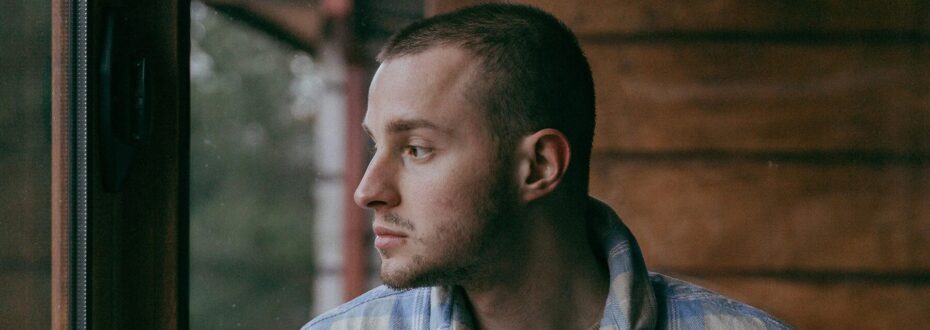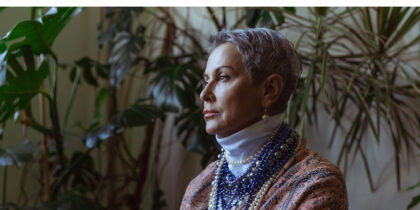This year marked Mother’s Day number 12 without my mum. That is 12 rounds of TV adverts, Instagram posts, Card Factory cards and Sainsbury’s banners unwittingly shoved down my throat. Every year I am asked how I am doing and every year I say, ‘yeah, I’m actually doing okay thanks’, and I am. Until the end of Mother’s Day that is. Around 7pm every year something happens. I realise that this made-up day (and it is the most important made-up day out of any of the made-up days), has once again passed me by without me being able to share a moment with my mum. And so I wonder what she would look like 12 years on from her death, what she would sound like, how aligned we would be and what she would make of her son 12 years on.
My name is Nick, my mum died of a heart attack in front of me and entirely unexpectedly when I was 17, and I work for a mental health charity. Seems a bit of an odd collection of words jumbled together in that sentence, and yet I think it makes perfect sense. We all experience death – it is, unfortunately, the only guarantee in life – and yet we barely talk about it. Research suggests that around 26,900 parents die each year in the UK, leaving dependent children. That’s one parent every 20 minutes.
Losing a parent at any age is a traumatising experience; anyone who has been through this, whether they are 17 or 64, will know exactly what I mean. I found the sense of isolation as a 17 year old overwhelming. Often, you are the first person in your social circles to have had to experience this type of grief and, as a result, the support that comes alongside this is usually inadequate. Socially, friends and family don’t know how to approach the topic (hint: your best bet is often asking the person how they would like to talk about it) and practically (or clinically), you often get offered no more than a couple of brochures and an advice line that you can call. The support offered by school is often piecemeal, too, and you end up having to try to make sense of this new journey on your own.
When my mum died, having been entirely healthy her whole life, I was thrown into a world of chaos, and now, with hindsight, I refer to it as my very own rollercoaster. There is, so you believe, no one around you that understands you; you feel isolated, scared, angry, alone and lost. What I am getting at here is that provision of care for those experiencing a close death, and especially for children, is often second-rate at best. This is not necessarily the fault of anyone – even if it’s partly due to austerity policies where this kind of therapeutic support is often the first to go. However, we have a conversation problem in this country. We’re fearful of having conversations about death, which from an early age is kept ‘hush hush’.
My experiences of this meant that friends, teachers, and others who knew started to treat me differently. Some became overly friendly, others stopped talking to me and others still attempted the ‘everything happens for a reason line’ (don’t attempt that line, ever). These expressions of silence, awkwardness or newfound chattiness have the effect of making you feel like you are further removed from the everyday life of a 17 year old than you already are. Shifting our culture on this wouldn’t mean reinventing the wheel. Instead, asking the person how they are doing and giving them the space to answer would be a starting point. You will quickly understand if the person does not want to talk about it. If they don’t, go back to treating them as you did before the death. People often feel that someone who has experienced a recent death won’t want to talk about their favourite football team, or the book they are currently reading. In fact, often, this is exactly what they want.
There is, however, a caveat to the above suggestions – and that is patience. Often, and especially at a young age, people do not understand that grief is not ‘just another problem’ and it does not take a few weeks to ‘get over’. For me, the trauma I experienced, I still live with every single day. I am blighted by images of my dead mum and have been through countless rounds of therapy to help me. What I found was that after a few weeks, those around me stopped with any questions all together and assumed that I must ‘be better’.
It is hard to describe how overpowering grief can be as a young person, or as a human of any age. And I do not believe that schools, workplaces, and society generally have built in the necessary support measures to help people through their grief. Ultimately, we will all go through grief and death at some point in our life, so why are we so bad at talking about it?
So, what did I go through? Bluntly, I called an ambulance at 6am on the 6th September, I gave CPR to my dead mum at 6.01am, I watched her get wheeled away on a stretcher into an ambulance at 6.50am and at 7.20am I was sitting in resuscitation in St George’s hospital holding her still warm hand and saying goodbye to her. I then got in a taxi and life went on.
I didn’t speak about this trauma for several years, instead turning to alcohol to take the pain away. I created a world filled with anger, resentment and hurt to deal with my trauma. Then, slowly, off my own bat, I started to seek help. I saw two university counsellors; I did three rounds of CBT and took Sertraline for a number of years. I was lucky enough to get support when I needed it because when I looked, I found pastoral care whilst at university.
However, many are not so fortunate. Numerous children and young people will not attend university, will not have the time, privilege, or financial resources to seek out appropriate help, or even know where to look. I will never forget the few people that stuck with me through those years, bringing me food, asking me how I was, making me do things that didn’t involve alcohol. Equally, I will never forget the help I received from therapists and other trained staff. Without these people I would not be where I am today and would have ended up in a vastly different situation.
There is no moral to this story, but I hope I can provide some hope, some reality, and some clarity to this, at times entirely absent, conversation. Bereavement is real, death is hard, and losing someone will have an impact on your mental health. However, more people than you will ever realise have been through it, understand it and are willing to talk about it. So here’s to building a society that normalises all of our stories and makes it possible for everybody to seek help in the individual ways we need.




